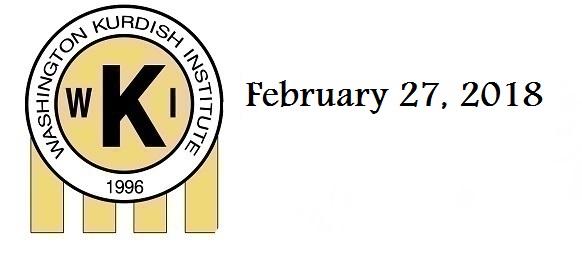925
Iran
- On February 24, the Kurdistan Democratic Party of Iran (KDPI) held its party’s Congress. In this 16th Congress, the KDPI reelected its leader Mustafa Hijri as the General Secretary. Hijri told Rudaw that the party had changed its structure for the “distribution of power.” In March of 2016 the KDPI announced the renewal of armed struggle against the Iranian regime.
- Because of the harsh realities of poverty and socio-political repression, a Kurdish mother in Mehabd city ended her life. According to the Kurdistan Human Rights Association (KMMK), the woman’s husband was arrested by the Iranian government for “smuggling goods.” The Kurdish woman is survived by her four children. In Baneh, the KMMK reported that a strike took place by Kurdish workers and businessmen after the Iranian regime, in coordination with the Iraqi government, shut down a border crossing between the Kurdistan region of Iraq and Iranian Kurdistan. In the past year, there has been a notable increase in suicides among the Kurdish community, especially in light of the dire economic situation and high unemployment level in the Kurdish areas of Iran.
Iraq
- The Iraqi government extended its flight ban on and blockade against the Kurdistan region for another three months. The decision came on February 26 and was described by the Iraqi Prime Minister’s office as “routine.” Iraqi Prime Minister Haider Abadi has yet to release the constitutionally guaranteed budget for Kurdistan nor the salaries for the region’s employees. The blockade against and the flight ban on the Kurdistan region started after the region’s Independence Referendum on September 25. After the referendum the Iraqi army, in conjunction with Iranian-backed militias, attacked and gained control of the disputed territories between Baghdad and Erbil.
- Thousands of people in the Kurdistan region protested against Turkey’s ongoing invasion of the Kurdish city of Afrin in Syria. The protests took place in the Kurdistan region’s capital of Erbil as well as in Sulaymaniyah, Rania district, Koya District, and Kalar district. Protesters chanted slogans against Turkey’s military campaign which, to date, has resulted in hundreds of civilian deaths.
- After pro-government Iraqi militias were ambushed by ISIS fighters last week, a terrorist was killed before blowing himself up in front of the headquarters of Asaib Ahl Al-Haq, an Iranian-backed militia, in Kirkuk city. Last week, organized gangs stole 49 power transfers with cables in the southern neighborhoods of Kirkuk city which led to more power shortages. Despite statements by the deputy governor of Kirkuk about the stability of the city’s security, a wave of assassinations and thefts have been perpetrated across the province since October 16, 2017.
Syria
- In coordination with Syrian Islamist militias, Turkey’s military operation against Afrin continued into its fifth week. On February 26, in Janders district, Turkey conducted more airstrikes against the region, killing 5 civilians. Meanwhile, intense clashes continued in the Shira and Rajo districts. On Saturday, the United Nations Security Council voted for a 30-day ceasefire across all of Syria. French President Emmanuel Macron told Turkey’s President Recep Tayyip Erdogan that the Syria truce also applies to Afrin. However the Turkish military campaign did not stop. In contrast, the U.S.-backed Syrian Democratic Forces (SDF) agreed to the truce but reserved the right of “self-defense” against aggressive forces like Turkey and its Islamist allies. As a result of the Turkish invasion, more than 4,000 students in the region have been prevented from attending school. A total of 192 civilians were killed and 574 wounded since Turkey’s invasion, according to the Co-Chair of Afrin’s Health Council Angela Resho.
- On Saturday February 24, Czech Republic police detained Salih Muslim, a prominent Syrian Kurdish politician and former Co-President of the main Kurdish party in Syria, the Democratic Union Party (PYD). After a request from the Turkish government via Interpol, the police raided Muslim’s hotel and arrested him while he was in Prague to participate in a conference about Syria. In Europe, protests demanding Muslim’s release broke out in several cities; protesters also demanded that Czech authorities refrain from handing Muslim over to Turkey. Many European officials called on the government of Prague to release Muslim. On February 27, a hearing on Muslim’s case took place in the Czech capital of Prague, which determined his release despite Turkey’s objections. Since the establishment of the self-administration government in northern Syria, Muslim has visited Turkey in an official capacity on a number of occasions — this was before the Erdogan government changed its stance on the Kurds in 2015, when Turkey decided to abandon peace talks and begin escalating aggressive moves against Kurdish people both within and outside its borders.
Turkey
- Turkish police arrested two Kurdish singers for singing Kurdish songs at a wedding. Both wedding singers, Ihsan Acet and Inayet Sarkic, as well as the father of the groom were brought to court for singing Kurdish songs at a wedding. The Turkish court arrested them for promoting “propaganda for a terrorist organisation.” The Kurdish singers’ lawyers said the singers sang songs, in the Kurdish language, about the civilians being attacked and killed in Afrin.
- The Pro-Kurdish Peoples’ Democratic Party (HDP) lawmaker Feleknas Uca criticized the German government’s relations with Turkey, as German weapons have been used by Turkey against Kurds in Afrin, Syria. “Everybody develops politics over the Kurds,” Uca said, commenting on a meeting between German and Turkish officials that recently occured. “They make Kurds into tokens of negotiation.” She added that: “German tanks are being used against Kurds again. In the 1990’s, German tanks were used to burn and destroy Kurdish villages and to kill civilians. Today, civilians are killed with German tanks again in Afrin.”

